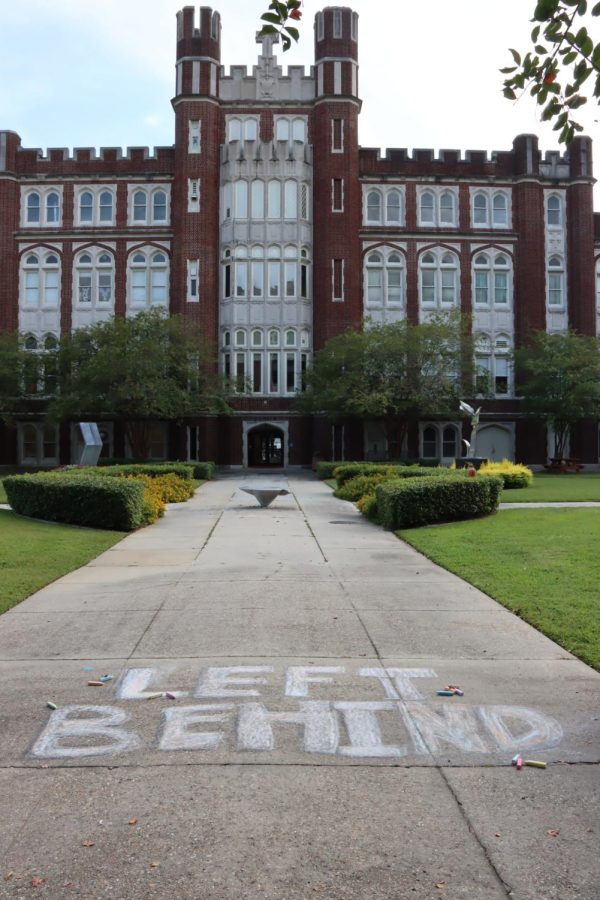Professors feel left behind with frozen salaries, lower retirement contributions
“Left behind” written on the sidewalk in front of Marquette Hall. In response to unfair faculty wages, a Loyola professor wrote a message in chalk on the sidewalk asking God for a raise.
September 29, 2022
Pat Jackson’s son asked them recently why they weren’t as happy at their job anymore. The tenured full professor, whose name has been changed in order to remain anonymous out of a fear of reprisal, said that they didn’t know how to answer him.
But Jackson did tell The Maroon last week that the main reason they are less happy than they used to be at Loyola comes from feeling “chronically undervalued” by the university. This feeling manifests in one main way, they said: making a salary of under $65,000 as a member of the faculty for close to 15 years with a doctorate degree. Jackson said the salary has them living month to month again for the first time since graduate school.
Jackson isn’t alone in their frustration over pay. Beginning after a catastrophic recruiting year nearly a decade ago, the university suffered through years of deep financial trouble, the result of which was that pay raises were frozen across the board. The financial troubles hit a crescendo in 2018 when the Southern Association for Colleges and Schools put Loyola on financial probation. The university has since balanced its budget and was removed from probation, but to the dismay of many faculty members, cost of living or merit-based pay raises have not yet returned.
“What do we have to do? Go into the dean’s office and start sobbing? Would that make a difference?” they said.
Jackson argued that their struggle has stretched across all ends of campus, with faculty members in each college joining together in an attempt to be seen, and their decision to speak out about it has already had an impact.
But faculty got the first glimmer of good news when the university sent out an email to professors and staff Thursday morning, Sept. 29, announcing that they had issued $1.4 million in one-time payments to 212 employees. The payments were in response to a compensation study, which examined faculty and staff salaries beginning last year.
Interim University President, The Rev. Justin Daffron, S.J. said that if faculty members hadn’t received a letter indicating that they will personally be receiving a lump sum payment as of Thursday morning, that it was because their current salaries were “within the range for (their positions).” Daffron encouraged faculty members asking for more specific information about the study and their salaries to reach out to their departments’ deans.
Daffron said during the fall convocation that while the budget is in better shape than in the past, it was not yet in sufficient shape to give across the board raises, which is why it was opting for a one-time payment for now. He added that raises would require further growing university revenue.
“Resource growth is a top priority in our goals for this year,” Daffron said, adding “This revenue growth will be used to reinvest back into the people of Loyola.”
The university froze salaries in 2013 in an attempt to prevent Loyola going deeper into a monetary deficit after being required to draw tens of millions of dollars from the university endowment just to balance the budget. And the need to do so proved necessary when the university didn’t meet their recruitment goal for freshman students in 2013. In 2016, faculty members voted “no confidence,” for a former university president The Rev. Kevin Wildes, S.J. in response to the university financial management.
In an effort to quantify how bad things had gotten, last semester, faculty members met independently to create a document that would allow them to share their salaries anonymously, in an effort to incite change, Jackson said. The university wouldn’t immediately comment on that either.
But after years of no raises and having had retirement benefits cut down from 8% to nothing from summer of 2018 to the summer of 2021, Jackson said professors are tired and have been ready for the administration to take action.
“Who’s even going to talk about this? Who even has the energy to talk about this or organize?” they said.
The university announced during faculty convocation in August that it will continue to contribute to faculty retirement at 2% a year.
‘Dear God’
The conversation about faculty salaries was prompted this year during faculty convocation, but one professor continued to draw attention to the issue earlier this month. Sept. 8, Mark Yakich, a tenured full English professor, wrote a message in chalk on the sidewalk outside of Bobet Hall for those on campus to see.
The message read “Dear God I would like a raise your humble servant Professor Yakich. P.S. it’s been 12 years.”
Yakich said the message was an effort to get Loyola to see that their professors are desperate for a university response. He additionally argued that the university said that it is waiting to act until it was more financially stable and said that the problem of financial instability is affecting all universities.
“I can understand both of these arguments, but these arguments do not mitigate the actual struggles of faculty and staff. As a faculty member at a Jesuit university, one would expect a greater vision for our community – greater vision, and far more swift action,” he said.
‘Deep uncertainty’
And according to Loyola’s 2020 form 990 tax return, the numbers speak for themselves. Tania Tetlow, former university president, reportedly made close to $600,000.
Other professors and administrators included on the form recorded salaries of more than $350,000 and for several others, just under $200,000.
According to the American Association of University Professor’s 2021 salary survey, Loyola’s average salary for full professors is $108,300 — far below the national average of $143,823. But at the same time, Jackson and several other tenured full professors say they are only earning a fraction of the AAUP number. The discrepancy is large because as the university froze faculty pay for those who stayed, it had to pay market rates to those who came after salaries were frozen.
But many faculty members didn’t even realize the disparity, including Jackson. That changed when they went to speak at another Jesuit university that was close to the same size as Loyola, where they overheard faculty members there speaking about salaries.
When Jackson heard that their colleagues made more than double what they did, Jackson was shocked – and felt undervalued.
Jackson said they knew that Loyola had been falling behind because of the ways in which the board froze faculty salaries during a previous presidential administration, but in the moment in which their peers were discussing salaries, they realized how bad the gap had become.
“That’s when I started tuning in more to the need for real change here,” they said, adding that they participated in that change by advocating for wages as a member of the university Senate.
Soon after, they said they were excited to hear the university was on its way to rectifying the conditions with a compensation study, especially when they heard the university budgeted a pool of money to make changes.
Jackson said the university ensured everyone made at least $15 an hour, which Daffron announced in an email sent to faculty and staff in May.
But Jackson said he felt that because he wasn’t a part of that group of people, he was left behind, regardless of a much higher industry standard salary. The same went for Jackson themselves,Yakich and Jonathan Peterson, an associate professor of philosophy at Loyola and the former chair of the faculty Senate.
Peterson, who makes a base salary of under $61,000, told The Maroon that having frozen salaries for about a decade now has been “traumatizing” for faculty.
“There’s been this deep uncertainty over the health of the university,” he said.
He added that it’s humiliating that faculty salaries have fallen off as much as they have, arguing that there’s only one thing that will fix tension between faculty and administrators and that is being paid better.
“They’ve tried every kind of other, symbolic gesture, and I appreciate that, but at this point, they need to pay people fairly. They need to contribute to our retirement in the way that other institutions do,” he said.
He said that it is honorable to see Loyola being committed to Jesuit values as an institution, but he argued that the institution hasn’t shown that it is committed to those values internally.
“It’s time for Loyola to really take that commitment to those values seriously and to start living in accordance with them,” he said Thursday, Sept. 22.
On Wednesday, Sept. 28, Peterson received a letter from the provost’s office, granting him a one-time payment of about $8,500, which the letter said was in response to the university’s compensation study.
‘Out of touch’
The effects of salary discrepancies have stretched farther than an emotional response. Jackson said their family’s lifestyle has had to change drastically in order to accommodate rising prices in New Orleans with a frozen salary.
This included moving homes much farther from campus to be able to afford real estate and to be able to make sure their children have had everything they’ve needed.
“My employer seems out of touch with the realities of living in this city,” they said.
Peterson said that it also makes Loyola fall behind in ways they can’t afford to, including the recruitment of faculty of color.
He said that by not having competitive wages, the university risks not being able to recruit people in general, and that includes people of color, who he said are essential to the advancement of the university.
“There’s certainly the issue that students are not seeing faculty who represent them, and I think that’s a problem,” he said.
Jackson added that as faculty leave the university due to a lack of competitive wages, more work falls on the faculty members who stay.
And the effects also include faculty members’ ability to do their jobs on campus. One of the main ways this manifests is through advising, they said.
Because their department, like many other university departments, is shrinking as professors retire or leave due to a lack of competitive salaries, professors like them are now responsible for dozens more advisees than they have been in the past.
“The whole thing becomes unsustainable and exhausting,” Jackson said. “You just can’t replace the value of one-on-one working with students.”
They said that this is also relevant to senior capstone projects where tenured faculty are required to advise each project carefully.
Also, as faculty go, majors start to decline as the quality of teaching falls behind and fewer students therefore choose to major in a subject, Jackson argued.
“How are we supposed to grow?” they said.
Jackson didn’t deny that there have been administrative conversations that have taken place about this. But until the one-time payments were announced there had never been any follow through, they said.
“It’s been too long of these hollow promises,” Jackson said.










Loyola Prof • Sep 29, 2022 at 10:09 pm
I accepted a visiting assistant professor position at Loyola early during the pandemic when many academic job searches were canceled. I accepted this position over other higher-paying job offers because those other offers were for lecturer positions, and in my determination the visiting assistant professor position would be better for my career moving forward. I made my salary work, even though summers have been difficult when I go more than a month without getting paid. But that was before my rent and bills went up, and now I’m worried that if I’m hit with a several-hundred dollar Entergy bill hike like so many others have received that I will have to find another job on the weekend. I didn’t go into academia because I expected to make a lot of money, but I did expect to feel secure that I could live relatively comfortably. With prices rising across the board, I don’t know how much longer I’ll be able to keep this up.